Download Debating Genocide PDF Free - Full Version
Download Debating Genocide by Lisa Pine in PDF format completely FREE. No registration required, no payment needed. Get instant access to this valuable resource on PDFdrive.to!
About Debating Genocide
This book explores the subject of genocide through key debates and case studies. It analyses the dynamics of genocide – the processes and mechanisms of acts committed with the intention of destroying, in whole or in part, a national, ethnic, religious or racial group – in order to shed light upon its origins, characteristics and consequences.Debating Genocide begins with an introduction to the concept of genocide. It then examines the colonial genocides at the end of the 19th- and start of the 20th-centuries; the Armenian Genocide of 1915-16; the Nazi ‘Final Solution’; the Nazi genocide of the Gypsies; mass murder in Cambodia under the Khmer Rouge; the genocides in the 1990s in the former Yugoslavia and Rwanda; and the genocide in Sudan in the early 21st century. It also includes a thematic chapter which covers gender and genocide, as well as issues of memory and memorialisation. Finally, the book considers how genocides end, as well as the questions of resolution and denial, with Lisa Pine examining the debates around prediction and prevention and the R2P (Responsibility to Protect) initiative.This book is crucial for any students wanting to understand why genocides have occurred, why they still occur and what the key historical discussions around this subject entail.This book is a concise introduction to a complex field with a large and growing scholarly literature. It presents an accessible point of entry into the subject, introducing major debates and the current state of research. This book covers a limited but significant range of genocides. Chapter 1 treats the subject of colonial genocides. Chapter 2 examines the Armenian genocide undertaken by the Young Turk regime or Committee of Union and Progress (CUP) during the First World War. Chapter 3 examines the history of the Holocaust or the Shoah (‘destruction’). Chapter 4 examines the history of the genocide of the Sinti and Roma or the Porrajmos (‘devouring’). Chapter 5 moves to a discussion of Cambodia under the Pol Pot regime between 1975 and 1979. It explores whether the massacres that took place under the Khmer Rouge can be more accurately described as genocide or politicide or both. Chapter 6 examines the genocidal violence in the former Yugoslavia and Chapter 7 focuses on the genocide in Rwanda. Chapter 8 analyses the Darfur genocide in Sudan. Chapter 9 addresses select themes: genocide prevention; justice; memory and memorialisation; and gender.
Detailed Information
| Author: | Lisa Pine |
|---|---|
| Publication Year: | 2018 |
| ISBN: | 9781350035447 |
| Pages: | 217 |
| Language: | English |
| File Size: | 2.579 |
| Format: | |
| Price: | FREE |
Safe & Secure Download - No registration required
Why Choose PDFdrive for Your Free Debating Genocide Download?
- 100% Free: No hidden fees or subscriptions required for one book every day.
- No Registration: Immediate access is available without creating accounts for one book every day.
- Safe and Secure: Clean downloads without malware or viruses
- Multiple Formats: PDF, MOBI, Mpub,... optimized for all devices
- Educational Resource: Supporting knowledge sharing and learning
Frequently Asked Questions
Is it really free to download Debating Genocide PDF?
Yes, on https://PDFdrive.to you can download Debating Genocide by Lisa Pine completely free. We don't require any payment, subscription, or registration to access this PDF file. For 3 books every day.
How can I read Debating Genocide on my mobile device?
After downloading Debating Genocide PDF, you can open it with any PDF reader app on your phone or tablet. We recommend using Adobe Acrobat Reader, Apple Books, or Google Play Books for the best reading experience.
Is this the full version of Debating Genocide?
Yes, this is the complete PDF version of Debating Genocide by Lisa Pine. You will be able to read the entire content as in the printed version without missing any pages.
Is it legal to download Debating Genocide PDF for free?
https://PDFdrive.to provides links to free educational resources available online. We do not store any files on our servers. Please be aware of copyright laws in your country before downloading.
The materials shared are intended for research, educational, and personal use in accordance with fair use principles.

